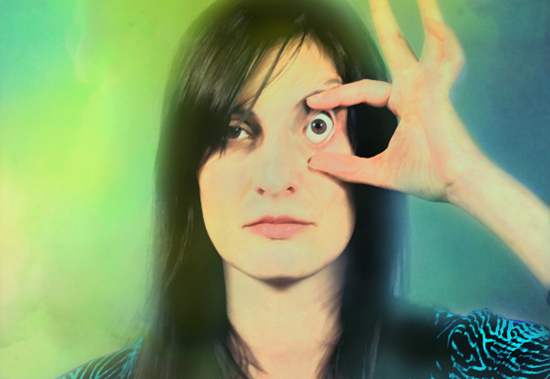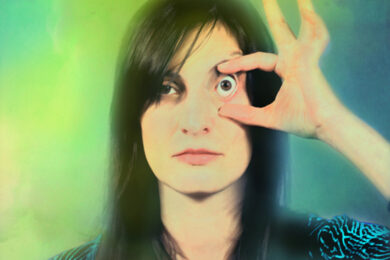Although – and perhaps also because – it isn’t Important or Influential, the 2006 collaboration between EDH (Emanuelle de Héricourt) and similarly minded producer Hypo, The Correct Use of Pets, has probably been one of my most replayed albums of the last decade. Its bricolage pop was undoubtedly post-modern but not merely as a smirking anti-statement; assembled from uncanny samples and analogue keyboards, it re-imagined 80s new wave electronic pop, lounge music and all manner of dance music styles.
Hypo has described how he used to take “great pleasure in wringing music’s neck. It was good, necessary and healthy. And I still do it to a certain extent. But at a certain point, our generation woke up next to a cold corpse that everyone had been sticking their boot into, and we really had to decide what to do with it.” He suggested that The Correct Use of Pets marked the beginning of a recovery of sorts. That’s one reason that, while it was undoubtedly of its moment (and, I suppose, of the moment we’re still in) – a natural reflection of accumulated pop musical history, of mental clutter, of perspectives, a series of tiny music and mental U-turns, flipping and flitting around – it’s also rather moving.
The other reason is the partnership with EDH and the very particular, brittle emotionality that she brings to everything she does, which is partly linked to the quietness and lack of expressiveness in her voice, but also the sense that her words and ideas stay as close to the original impulse as possible.
“Yes, it’s very spontaneous,” she confirms. “Some of the things I sing don’t really mean anything. Certain syllables and consonances appeal to me. I don’t think I can put it better than that. Most of the time, I keep the first take. I like vague vocals, so that they can be closer to a state than a conscious thought. It’s something I can do easily in English. It’s not my language so I don’t have any qualms about torturing it. Sorry!”
de Héricourt’s music combines machinic order and fleshly imperfection, pop-wise finesse and DIY mess, with vocals that seem to be anything but performances of self. In the past I’ve tried to relate it to sub-personal or only fleetingly registered processes and inarticulable impressions, neuron signals, the processing of external stimuli, in a way that’s close to what the Russian-born French writer Nathalie Sarraute called tropismes: “things that are not said and the movements that cross our consciousness very rapidly; they are the basis of most of our life and our relations with others – everything that happens within us which is not spoken by the interior monologue and which is transmitted by sensation”.
(New song ‘Flying Bye’ features the repeated lines “those creatures in my head / crawling and go ahead / never stop to talk” and “every song is a lie”.
“It’s about illusions, multiple realities, the conclusion that my songs, and those of others are individual and collective lies,” says de Héricourt.)
Consequently, EDH’s isn’t ‘warm’ music. It doesn’t tear you out of yourself or raise you off the floor like, say, a big sixties ballad. These are more the kinds of songs that absorbed cumulatively, repeatedly, bed in, start to bind themselves to your rhythms, syncing with your nervous system. This is probably truest of the sprawling sketchbook-album New York Tracks 2001-2002 (available as a free download here), the title of which has more than just documentary significance.
In a previous interview (one that actually featured EDH and Hypo interviewing each other, a clever effort-avoidance ruse, I thought, until I saw how much interesting material they’d come back with that I now had to translate) she said:
“I experienced the events of September 11th from very close up. I saw people around me crying and running when the towers collapsed. I’ve long been haunted by the people we saw throwing themselves from high up in the towers. Just the evening before, I had been in their position, contemplating New York by night from the 100th floor. There was a genuine risk of death that day. Then the images were replayed on a loop for several weeks, and there was a kind of saturation effect. The event became a symbol of a new media era. But it really happened for me. And I think that day I experienced the horror of what a war would be like. I became aware that a human body could suddenly be disfigured, mutilated and burned in a moment. I was profoundly affected by that, and inevitably there are ripples from that in my music. There isn’t a ‘before’ music and an ‘after’ music, but definitely a certain hardness that is now part of it somehow.”
More recent music has definitely been more muscular, and more solidly conceived. Previous release Prédature, her first on Lentonia records, was also her first attempt at a “proper” album, and the latest, Yaviz, stays on that path. “It’s definitely the second album that I’ve conceived in a fairly classic way,” she says. “These albums have also both been released on vinyl. A round record in a square sleeve with music carefully arranged inside.”
Yaviz is also quite noticeably her most conventionally poppy to date. There are of course the usual losses and gains inherent in this kind of trajectory – some of the fragile, sketchy charm of old is displaced by a greater sonic heft and a surer touch.
“My tracks are generally accessible via their melodic qualities but less approachable in other ways,” she says. “For a lot of people, my album fits into the category of ‘strange music’. I think my music requires a little attention and a bit of distance. If those are absent then lots of things about it seem ‘strange’. That said, the sounds on Yaviz are more direct and the production is more forceful, and that’s a good thing if it makes it easier for people to get into it.”
Actually, although it bears her unmistakable stamp, from the fidgety percussion to the insistent bass guitar lines (more prominent than ever) this harder surface and the album’s more garish colouration have meant that it’s taken longer than usual to crack Yaviz open, or for it to open itself up to me – a matter not helped by the fact that it kicks off with its least lovely track, ‘Ice’. But gradually there’s been some mutual adaptation, and it has mostly revealed the same addictive quality as its predecessors.
The shift can also be partly attributed to Yaviz being conceived in a more “social manner” than Prédature and New York Tracks. “I was really keen to play this record live. And not play it alone.” EDH live is now a trio that includes Elmapi, who also runs Lentonia with assistance from de Héricourt.
“We’ve been working together since the release of Prédature. At that point, the label was just starting out. We got on well and naturally we continued working together for future releases from Unison, Video Love, Phoebe Jean and Alex June. Looking after a label and being a musician is quite difficult – they’re two occupations that are out of phase with each other and sometimes completely antonymous. Putting out records has become almost anachronistic. We carry on in spite of everything, heads down, convinced that we’re doing what we have to do.”
Then there’s been the impact of becoming a mother.
“My rhythm of life has changed profoundly. These are stories that play out over time and that undoubtedly alter your manner of seeing things. But deep down I’m still the same person and my needs are the same. If anything, my natural tenacity has been given a serious boost."
How much has changed in her approach over the years?
“I work with the same energy. I always feel that every track will be my last. But at the time of New York Tracks, I was happy to bury the listener under a mound of music. Now I take longer over my writing and I’m a bit more selective. These days, I find the constant flow of new music on offer overbearing. The idea of producing less, and doing it more slowly, appeals to me. As a reaction against our frenetic era I’d like to produce and consume less. I’m in favour of less growth.”



